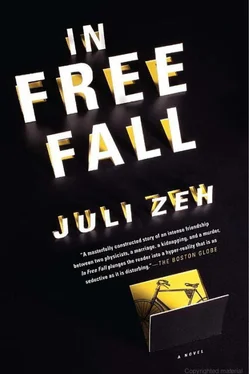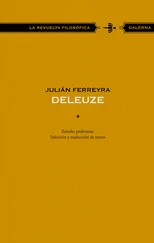Schilf not only knows the man but can also visualize him, hunched into his own body fat, perched behind a desk of presidential proportions. When the newly appointed chief public prosecutor had the immense piece of furniture delivered at his own cost, the laughter of the Freiburg judiciary had been heard all the way to Stuttgart.
This colossus of a man hates being on call during weekends. And he also hates summer. In summer, women like Rita Skura walk around in flowery dresses while men have sweat running down their buttoned-up shirt collars. The chief public prosecutor has probably not invited Rita Skura to come in. The door was wrenched open the very moment she knocked. She has already ruined the previous evening with her phone calls; now she stands before him like a Joan of Arc from Baden, offering herself up as her heaviest cannon, the hands on her hips a challenge. As she speaks, the chief public prosecutor plucks at his hair, observes her for a moment, and visualizes her floating to the ground. All the while he grinds his jaw incessantly, as if he were chewing on something. As soon as Rita has finished, he heaves himself out of his armchair with a groan and closes the window. What he has to say does not need an audience.
“Listen,” Rita says on the telephone now. “No forty-eight-hour remand if he makes a full confession. That’s all that was possible. I had to swear to God that he is not a flight risk.”
“If he were a flight risk he would be long gone. It’s not far to Switzerland.”
“If it were that simple,” Rita says, insulted, “why didn’t you explain it to the public prosecutor yourself?”
A fat woman with dyed red hair and plucked eyebrows approaches in her apron and puts a cup down on the table.
“It’s normally self-service here,” she says.
“Because it’s your case after all, Rita, my child,” Schilf says. “Excellent work. You’ll be police chief in no time.”
He puts twice the required amount into the serving woman’s outstretched hand and looks away to avoid her death stare. The coffee is surprisingly good. It’s a good day all in all. The detective is doing the right thing and getting what he wants.
“Toady,” Rita says. “Of course it’s my case. And it’s the last one that you’ll be interfering with.”
“Believe me, I’ve only been sent in the name of God. You’ll never have the misfortune of accepting my help again.”
“Glad to hear it.”
The detective thinks he would like to bottle a few of Rita’s snorts to tide him over in bad times.
“Now hand the guy over,” she says.
“How do you know it’s a man?”
“Women don’t decapitate their victims.”
“The New Testament would have it otherwise.”
“Wrong, Schilf. Salome asked for John the Baptist to be beheaded. That was secondary liability at best, or just incitement.”
“You know your Bible,” Schilf says in acknowledgment, “and the basics of German criminal law. What would happen if Salome had blackmailed the murderer into doing the deed, though?”
“This isn’t a seminar on criminal law!” Rita growls.
“Coercion,” Schilf says. “Extenuating circumstances according to the prevailing view?”
“Who… is.… it?”
With every word, Schilf thinks he hears Rita chopping the air with the side of her hand. Rita had been an astonishingly good shot during her training. You could tell from her hand, the detective thinks. He would quite happily stand in front of her while, feet shoulder-width apart, arms outstretched, she aimed a Walther PPK at him. The bullet would bore a hole in his forehead, pierce through the bird’s egg in his frontal lobe, and drill painlessly into his brain. Schilf sees himself falling to his knees and collapsing onto his side, as he has observed other men doing a few times over the course of his career. Set free by Rita’s hand, he would fly out through the hole in his forehead and finally mesh with the network of the universe, where there is no time and space, and would enter the state popularly known as “the past.”
What a lovely dream, the detective thinks.
“The physicist,” he says. “The one with the kidnapped son.”
He lights a cigarillo and enjoys the first puffs in total peace. Not even the sound of breathing comes from the telephone.
“Good,” Rita finally says. Her voice is businesslike, if a little husky. “I thank you.”
“Wait.” Schilf takes the cigarillo out of his mouth and bends forward, as if Rita were sitting on the other side of the table. “He was blackmailed.”
“At least,” Rita says slowly, “the case seems to have nothing to do with the hospital scandal.”
“You don’t know that yet,” the detective superintendent says sharply. “Were you listening to me? I said: Sebastian was blackmailed.”
“The police chief will cry with joy.”
“Rita!” The detective barely notices that the woman in the apron is beside him again. “Have you asked yourself why I’m telling you who it is? So that the case won’t be taken away from you! You’re the one with the most sense in that whole pigsty. Don’t tell me that I’ve been mistaken!”
“All right, Schilf.”
“The man is innocent,” the detective says.
“Surely. The main thing is, there’s no connection to the hospital scandal.”
The conversation is over. The line is dead.
“You’re not allowed to smoke here,” the woman in the apron says.
“Damn,” Schilf says.
“Absolutely no smoking here.”
The detective looks into her doughy face and flashes his police ID at her.
“Another espresso,” he says.
As the fat woman waddles hastily back to the counter, he drops his head into his hands. It’s practically impossible, inconceivable that he has just made a serious mistake. He is holding the cigarillo between his thumb and his index finger, and ash falls past his right temple onto the table. There is the smell of singed hair.
THERE IT IS AGAIN, THE DOUGHY FACE. Plucked eyebrows and dyed red hair in the shape of a cloud. This time the woman is a kind of librarian who is looking at the detective in an unfriendly manner. Her fleshy fingers are tapping away continuously with great precision on a computer keyboard. The familiar pounding has started behind Schilf’s temples.
“What do you want?”
It is not easy to answer this question. Schilf probably wants a new Rita Skura, one who is not thinking of her own career or of the walrus-mustached police chief, but only of how she can help the first chief detective superintendent in his mission for truth and justice. And he wants a slim librarian with hair that has been combed back, and a large room whose walls are lined with shelves of oak that go right up to the ceiling. He wants absentminded scientists who climb ladders to reach the volumes on the very top shelves. He wants green lampshades on antique desks.
Schilf is nauseated by the smell of the freshly cleaned carpet underfoot. Metal shelving divides the room into cells containing dark computer monitors. He is the only visitor. The conversation with Rita feels like rheumatism in his bones. He longs for a living being, for understanding and support, or perhaps just for the warmth of a freshly run bath.
“What do you want?” The librarian repeats herself slowly and clearly. She probably has to deal with confused foreign researchers quite often.
“Quantum physics,” the detective says.
The woman’s face shakes with silent laughter, and Schilf realizes that he has made a joke. He does not join in.
“Go ahead,” she says.
Schilf does not bother with the rows of books whose covers threaten investigations of the cosmological lambda term or the missing-mass problem. He sits down at one of the computers and types Sebastian’s name into the catalogue search function. The list is long. Schilf chooses two publications whose titles contain more familiar than unfamiliar words. He writes down the classification codes on a piece of paper and walks back to the desk. The librarian perches a pair of spectacles on her wide face and waddles over to a shelf of journals. The prim design of the booklets she pulls out would warn off any normal person from trying to read them. The librarian pats him encouragingly on the shoulder as she hands them over, and Schilf is left with his booty.
Читать дальше












